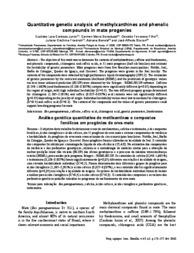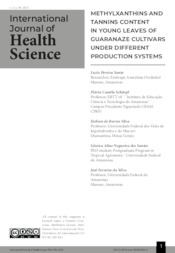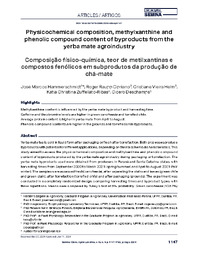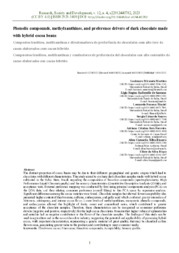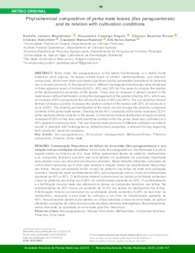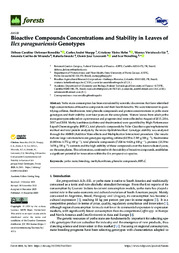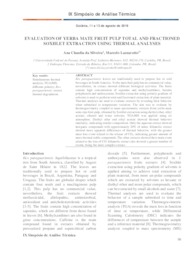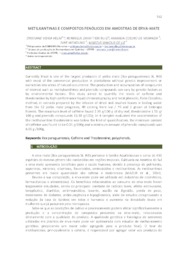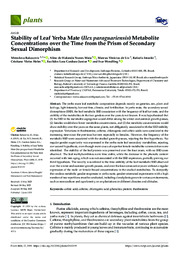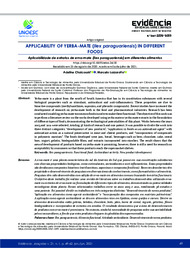Search Publications
Filter by:
| Author(s): CARDOZO JUNIOR, E. L.; DONADUZZI, C. M.; FERRARESE-FILHO, O.; FRIEDRICH, J. C.; GONELA, A.; STURION, J. A. The objective of this work was to determine the contents of methylxanthines, caffeine and theobromine, and phenolic compounds, chlorogenic and caffeic acids, in 51 mate progenies (half?sib families) a... ... |
| Author(s): SANTOS, L. P.; SCHIMPL, F. C.; SILVA, E. de B.; SANTOS, G. A. N. dos; SILVA, J. F. da This work was developed with the general objective of evaluating the potential of using young guarana leaves as raw material for the food, cosmetics and pharmaceutical industries, and with specific ob... ... |
| Author(s): HAMMERSCHMIDT, J. M.; CIPRIANO, R. R.; HELM, C. V.; ZUFFELLATO-RIBAS, K. C.; DESCHAMPS, C. Yerba mate tea is sold in liquid form after packaging or fresh after torrefaction. Both processes produce byproducts with potential for different applications, depending on their biochemical character... ... |
| Author(s): MARTINS, L. M.; SANTANA, L. R. R. de; MACIEL, L. F.; SOARES, S. E.; FERREIRA, A. C. R.; BIASOTO, A. C. T.; BISPO, E. da S. Abstract: The distinct properties of cocoa beans may be due to their different geographical and genetic origins which lead to chocolates with different characteristics. This study aimed to evaluate da... ... |
| Author(s): WESTPHALEN, D. J.; ANGELO, A. C.; ROSSA, U. B.; HELM, C. V.; RADETSKI, C. M.; GOMES, E. N. ABSTRACT. Yerba mate, Ilex paraguariensis, of the family Aquifoliaceae, is a native South American plant species. Its leaves exhibit levels of protein, methylxanthines, and phenolic compounds, which h... ... |
| Author(s): BENEDITO, D. C. D.; STUEPP, C. A.; HELM, C. V.; LIZ, M. V. de; MIRANDA, A. C. de; IMOSKI, R.; LAVORANTI, O. J.; WENDLING, I. Yerba mate consumption has been stimulated by scientific discoveries that have identified high concentrations of bioactive compounds and their health benefits. We were interested in quantifying caffei... ... |
| Author(s): SILVEIRA, A. C. da; LAZZAROTTO, M. Ilex paraguariensis leaves are traditionally used to prepare hot or cold beverages in South America. Yerba mate fruit pulp has no commercial value, nevertheless, its extract showed different biologica... ... |
| Author(s): HELM, C. V.; RUIZ, H. Z.; MIRANDA, A. C. de; WENDLING, I.; LIZ, M. V. de Currently Brazil is one of the largest producers of yerba mate (Ilex paraguariensis St. Hill) with most of the commercial production in plantations without genetic improvement or extraction into areas... ... |
| Author(s): RAKOCEVIC, M.; MAIA, A. de H. N.; LIZ, M. V. de; IMOSKI, R.; HELM, C. V.; CARDOZO JUNIOR, E. L.; WENDLING, I. Abstract: The yerba mate leaf metabolic composition depends mainly on genetics, sex, plant and leaf age, light intensity, harvest time, climate, and fertilization. In yerba mate, the secondary sexual... ... |
| Author(s): CHAICOUSKI, A.; LAZZAROTTO, M. Yerba-mate is a plant from the south of South America that has in its constitution substances with several biological properties such as stimulant, antioxidant and anti-inflammatory. These properties... ... |
Observation
Some of Embrapa's publications are published as ePub files. To read them, use or download one of the following free software options to your computer or mobile device. Android: Google Play Books; IOS: iBooks; Windows and Linux: Calibre.
Access other publications
Access the Agricultural Research Database (BDPA) to consult Embrapa's full library collection and records.
Visit Embrapa Bookstore to purchase books and other publications sold by Embrapa.

